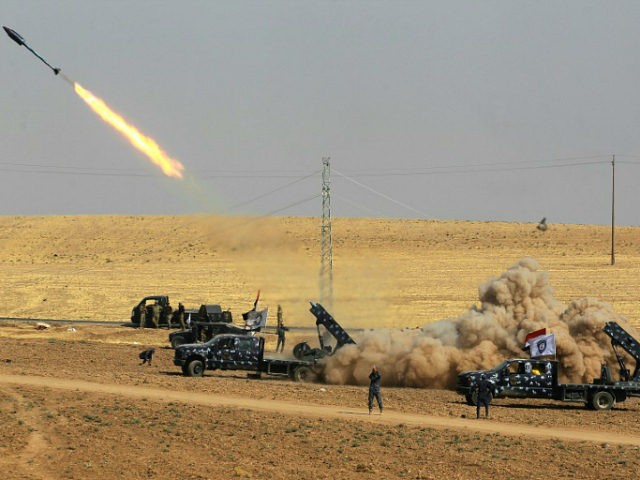Iraqi troops and Iran-backed Shiite militia forces launched a new offensive against Kurdish Peshmerga forces in northern Iraq on Thursday. The Kurds reported taking artillery fire from the advancing forces.
The Jerusalem Post reports that Iraqi armored vehicles and artillery, plus infantry and Shiite militia fighters, were involved in the attack near Iraq’s border with Syria and Turkey.
The Kurdistan Regional Security Council (KRSC) said it was “alarmed by intelligence signaling an imminent attack” northwest of Mosul several hours before the attack began.
The KRSC blamed two leaders of the Popular Mobilization Units (i.e. the Shiite militia) for instigating these “unprovoked attacks. The PMU responded that Peshmerga fighters provoked the battle by opening fire on Iraqi federal forces.
The Jerusalem Post points out the uncomfortable fact that both the Iraqi army and the Kurds they are attacking have been trained and equipped by the United States. The Kurds are being attacked and driven out of areas they were holding at great cost in a long battle against the Islamic State that only concluded a few weeks ago.
The objective of the operation appears to be cutting off border crossings used by the Kurdish-led Syrian Democratic Forces coalition to receive support from U.S. military bases in Iraq. Turkey considers the SDF to be in league with the violent separatists of the Kurdistan Workers Party (PKK) and is therefore unhappy with having an SDF presence so close to its border. The area under attack also includes trade routes and pipelines through which the Kurdistan autonomous region exports oil to Turkey.
The Washington Post expresses concern that “a protracted fight over border crossings could severely disrupt U.S. military activity in neighboring Syria” and could also interfere with the delivery of humanitarian aid to civilians displaced from the former Islamic State capital of Raqqa.
A spokesman for the Iraqi federal forces claimed they did not intend to use violence against the Kurds. “We are a major force, but we want to take it peacefully because they are still Iraqis. Therefore, we are waiting for them to retreat, but if they insist on fighting, then we will have no choice and will take it by force,” he said.
This spokesman, like the one for the PMU, claimed the Kurds fired first using mortars and rockets, killing at least seven members of an elite Iraqi police force.
The KRSC said on Thursday that Peshmerga positions were taking artillery fire from Iraqi and PMU forces located northwest of Mosul. The Kurdish council called on the United States to “stop Iraq’s reckless behavior.”
U.S. Secretary of State Rex Tillerson, speaking at a meeting with United Nations representatives in Geneva, said he was “disappointed that the parties have been unable to reach an entirely peaceful solution.”
Tillerson said he “encouraged Prime Minister Abadi to accept Erbil’s overtures for talks on the basis of the Iraqi constitution” during two meetings with the Iraqi leader this week. The overtures in question included an offer by the Kurds to “freeze” the result of their independence referendum, which passed by an overwhelming margin last month and begin a constructive dialogue with Baghdad.
Abadi rejected this offer from the Kurds on Thursday and said he “will accept only the cancelling of the referendum and following the constitution.”
“This is a blatant violation of the Iraqi constitution, which forbids the use of the army to settle political disputes. We condemn Iraq’s military aggression in the strongest terms,” the KRSC responded after Thursday’s assault.
“Iraq’s back in civil war. Today’s attack deepens public resentment in Kurdistan,” said Kurdistan Regional Security Council adviser Aziz Ahmad on Thursday.
“in the next 24 hours Abadi will have squandered the world’s support,” Ahmad predicted.
The Washington Post quotes Nicholas Heras of the Washington-based Center for a New American Security warning that if Shiite militias capture the border town of Fishkhabour, they could effectively lock U.S. forces out of Syria.
“Fishkhabour is more than just a border gate: It is the essential doorway for long-term American influence in Syria. And Iran wants to slam that gate shut,” said Heras.

COMMENTS
Please let us know if you're having issues with commenting.